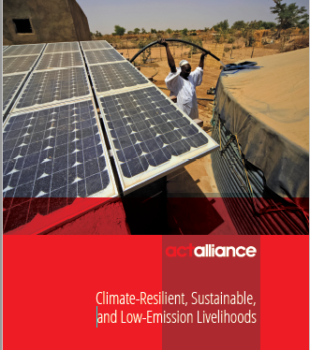 ACT Alliance is proud to launch it’s newest publication Climate-Resilient, Sustainable, and Low-Emission Livelihoods.
ACT Alliance is proud to launch it’s newest publication Climate-Resilient, Sustainable, and Low-Emission Livelihoods.
In a period of climate emergency, a more efficient means to secure survival and sustainable development is to find co-beneficial means to address climate-related issues with efficiency. Efficiency is needed because of the deep concern of the impact of the fast-evolving climate hazards on peoples, ecosystems, assets, and overall development. In the past, adaptation options have resulted in trade-offs or maladaptations that had adverse impacts, such as increasing greenhouse gas emissions, increasing gender and social inequality, undermining health conditions, and encroaching on natural ecosystems. Mitigation efforts may also create trade-offs with adaptation objectives, such as when priorities over bioenergy crops and forest regeneration compete with land needs for agricultural adaptation. This may undermine food security, livelihoods, and ecosystem functions and services.
This series of case studies explores community-based and other livelihood initiatives undertaken by ACT Alliance members.
